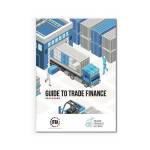Trade Finance – India

This content was produced in conjunction with ITFA.
Access trade, receivables and supply chain finance
We assist companies to access trade and receivables finance through our relationships with 270+ banks, funds and alternative finance houses.
Get StartedContents
Trade Finance – India
Welcome to the India Trade Finance and International Trade hub. Find out how our India-based team can help you access trade finance to increase your imports and exports, or find the latest research, information and insights on trade finance here.
What is trade finance?
Trade Finance is the financing of goods or services in a trade or transaction, from a supplier through to the end buyer. It accounts for 3% of global trade, worth some $3tn annually. ‘Trade Finance’ is an umbrella term, which includes a variety of financial instruments that can be used by an importer or exporter.
These include:
- Purchase Order Finance
- Stock Finance
- Structured Commodity Finance
- Invoice Finance (Discounting & Factoring)
- Supply Chain Finance
- Letters of Credit (LCs) and;
- Bonds & Guarantees
The terms Import Finance and Export Finance are used interchangeably with Trade Finance.
In order to address some of the common issues and misunderstandings around Trade Finance, we have put together this short guide.
How can trade finance benefit my India-based business?
Trade finance facilitates the growth of a business by securing funds required to purchase goods and stock. Managing cash and working capital is critical to the success of any business. Trade finance is a tool which is used to unlock capital from a company’s existing stock or receivables or add further finance facilities based on a company’s trade cycles.
Why does this help? A trade finance facility may allow you to offer more competitive terms to both suppliers and customers, by reducing payment gaps in your trade cycle. It is beneficial for supply chain relationships and growth.
Other benefits of trade finance
- Short to medium-term working capital, using the underlying products or services being imported/exported as security/collateral. It increases the revenue potential of a company, and earlier payments may allow for higher margins.
- Trade finance allows companies to request higher volumes of stock or place larger orders with suppliers, leading to economies of scale and bulk discounts.
- Trade finance can also help strengthen the relationship between buyers and sellers, increasing profit margins. It allows a company to be more competitive.
- Managing the supply chain is critical for any business. Trade and supply chain finance helps ease out cash constraints or liquidity gaps – for suppliers, customers, third parties, employees or providers. Earlier payments also mitigate risk for suppliers.
It is important to note that trade finance focuses more on the trade than the underlying borrower, i.e. it is not balance sheet led. Therefore, small businesses with weaker balance sheets can use trade finance to trade significantly larger volumes of goods or services and work with stronger end customers.
Due to the embedded risk mitigants that surround trade finance lending and instruments, it leads to the potential of a diversity of supplier base for trading companies. A more diverse supplier network increases competition and efficiency in markets and supply chains.
Companies can also mitigate business risks by using appropriate trade finance structures. Late payments from debtors, bad debts, excess stock and demanding creditors can have detrimental effects on a business. External financing or revolving credit facilities can ease this pressure by effectively financing trade flows.
If you have a trade finance enquiry, please use the contact form below.
Finance Queries:
in.team@tradefinanceglobal.com
trade.team@tradefinanceglobal.com
Partnership Queries:
introducers@tradefinanceglobal.com
Find out more about partnering with us here.
Want to learn more about Trade Finance?
Look no further. We’ve put together our feature India trade finance insights, research and articles, and you can catch the latest thought leadership from the TFG, listen to podcasts and digest the latest in international trade in the region right here.
Trade Finance – Frequently Asked Questions
Local Authors
Local Partners
- All Topics
- Indian Trade Resources
- Export Finance and ECA Topics
- Local Conferences
























